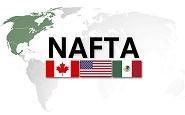Government/Policy

May 19, 2018
NAFTA Negotiations Miss Deadline
Written by Sandy Williams
NAFTA negotiators failed to reach an agreement in time for the U.S.-imposed deadline of May 17, potentially delaying a vote on the trade agreement by Congress until after the U.S. midterm elections and the Mexican presidential election.
“The NAFTA countries are nowhere near close to a deal,” said U.S. Trade Representative Robert Lighthizer in a statement. Sticking points include intellectual property, agricultural trade, duty-free levels for shipments, labor rules and the sunset requirement.
“We of course will continue to engage in negotiations,” he added. “And I look forward to working with my counterparts to secure the best possible deal for American farmers, ranchers, workers and businesses.”
On Wednesday, Lighthizer told the New Democratic Coalition that an agreement was not likely to occur this week.
Suggestions of a pared-down “skinny” NAFTA agreement were not embraced by the Trade Rep who acknowledged some “backsliding” in the discussions with Canada and Mexico.
Lawmakers in the Coalition agreed that a comprehensive NAFTA was preferable over a quick fix. Coalition member Rep. Ami Bera (D-CA) said, “from our perspective it’s better to get the right deal than a quick deal.”
Rep. Ron Kind (D-WI) told Inside U.S. Trade that Lighthizer indicated there were still problems to be solved. “He made it clear from the outset that on some of the major items there has been very little progress and in fact some backsliding in the last couple of weeks,” said Kind. “Whether it’s the five-year [sunset provision], whether it’s rules of origin [investor-state dispute settlement], there’s very little progress on any of them. So, we just want to make sure that the lines of communication are open and that we are privy to the text because we know that details do matter in this negotiation. We want to get our hands on text when it’s available.”
Kind added that the coalition made it clear that “it’s better to get a good deal than a fast deal” because a bad deal would be hard to get through Congress.
Sen. Sherrod Brown (D-OH) told Inside U.S. Trade, “I’m in no hurry. I think we want to get this done right.”
Said Brown, “The reason I don’t want a hurried, slimmed-down version is I think this is not only important to pass NAFTA, to get a renegotiated NAFTA for NAFTA’s sake; it’s also a template for trade in the future. I don’t want it on the cheap. I don’t want it slimmed down just for purposes of making it faster.”
Canadian Prime Minister Justin Trudeau remained optimistic on Thursday during comments to the Economic Club of New York. “To be honest, we are down to a point where there is a good deal on the table,” Trudeau said. “It’s right down to the last conversations…. I’m feeling positive about this, but it won’t be done until it’s done and people are working very, very hard on it right now,” he added.
Mexico sees a deal possible by the end of May. “If the conditions are defined by next week, nothing stands in the way of closing a deal by the end of May,” said Economy Minister Ildefonso Guajardo.
House Speaker Paul Ryan imposed the May 17 deadline, taking into consideration how long the International Trade Commission would need to complete its economic report on the agreement. The ITC has 105 days under the Trade Promotion Act (fast-track trade law) to complete its report for expedited consideration by Congress without amendments or procedural delays. When the 105 days commence depends on whether the ITC begins its review when the text is published or after it is signed 60 days later.
Congress must be notified 90 days before an agreement is signed, and the administration must submit to Congress any changes to U.S. law the agreement might require within 60 days of the signing.
Although Ryan says there may be some “wiggle room” in the procedure, it is likely that any deal will now be submitted for a vote in early 2019.







